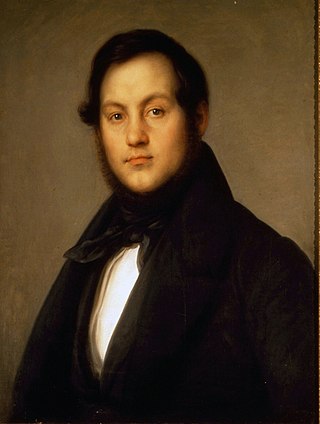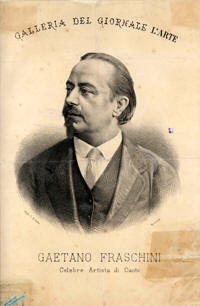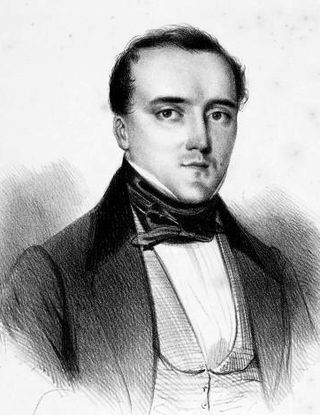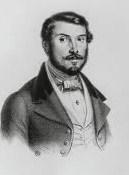Related Research Articles

Alessandro Polonini was an Italian bass-baritone. He created the roles of Benoît and Alcindoro in Puccini's opera La bohème, as well as Geronte de Ravoir in his Manon Lescaut. Polonini also created the role of the surgeon in Verdi's La forza del destino.
Domenico Reina was a Swiss bel canto tenor, notable for creating roles in the operas of Vincenzo Bellini, Gaetano Donizetti, Saverio Mercadante, and other Italian composers.

Eugenia Tadolini was an Italian operatic soprano. Admired for the beauty of her voice and stage presence, she was one of Donizetti's favourite singers. During her career she created over 20 leading roles, including the title roles in Donizetti's Linda di Chamounix and Maria di Rohan and Verdi's Alzira. She was born in Forlì and studied music there and in Bologna before making her debut in Florence in 1828. She sang in all of Italy's leading opera houses, as well as in Paris, Vienna, and London before retiring from the stage in 1852. She spent her remaining years first in Naples, where she had been the Teatro San Carlo's reigning prima donna for many years, and then in Paris, where she died of typhoid fever at the age of 63. From 1827 to 1834, she was married to the Italian composer and singing teacher, Giovanni Tadolini.
Raffaele Mirate was a celebrated Italian operatic tenor who had an active career from the 1830s through the 1860s. Known for his intelligent phrasing and bright and powerful vocal timbre, he was regarded as an outstanding interpreter of the tenor roles in the early and middle period operas of Giuseppe Verdi. He notably created the role of the Duke of Mantua in the world premiere of Verdi's Rigoletto in 1851. He was also a highly regarded interpreter of bel canto roles, excelling in the operas of Vincenzo Bellini, Gaetano Donizetti, and Gioachino Rossini.
Antonietta Marini-Rainieri was an Italian operatic soprano active during the first half of the 19th century. She was married to lauded operatic bass Ignazio Marini and often appeared on stage with him. In 1835 she portrayed Giulietta opposite Amalia Schütz Oldosi as Romeo in the Teatro Regio di Parma's first staging of Vincenzo Bellini's I Capuleti e i Montecchi. At La Scala she portrayed roles in the world premieres of Giuseppe Verdi's first two operas: Leonora in Oberto (1839) and the Marchesa del Poggio in Un giorno di regno (1840). She also appeared at that house as the Princess of Navarra in the premiere of Gaetano Donizetti's Gianni di Parigi (1839). In 1843, she sang the title role in the premiere of Giovanni Pacini's Maria, regina d'Inghilterra at the Teatro Carolino in Palermo. She reprised that role in December 1843 at La Scala, and at the Teatro Carlo Felice in February 1844.

Ignazio Marini was a celebrated Italian operatic bass. He sang in the world premieres of several operas by Gaetano Donizetti, Saverio Mercadante, and Giuseppe Verdi and appeared as a guest artist in major opera houses throughout Europe and in New York City, Mexico City and Cairo.

Gaetano Fraschini was an Italian tenor. He created many roles in 19th century operas, including five composed by Giuseppe Verdi. His voice was "heroic ... with a baritonal quality, ... yet Verdi and Donizetti appreciated his ability to sing softly and with subtlety." An Italian biographer has pointed out Fraschini's role in extending the longevity of Donizetti's operas, while at the same time accelerating the ascent of Verdi's repertory. He was indeed the most prominent singer who facilitated the transition from Donizetti to Verdi. Fraschini sang over one hundred roles and Verdi placed him at the top of his favorite tenors' list and described him as a "natural Manrico" for his Il trovatore. Fraschini also played a pivotal role in the success of many operas by Pacini and Mercadante.
Marietta Sacchi was an Italian operatic soprano who had an active career during the 1820s and 1830s.

Raffaele Ferlotti was an Italian operatic baritone who had an active international career from the 1830s through the 1860s. He was a regular performer in Italy's leading opera houses, especially La Scala, and created roles in several world premieres. On the international stage he performed in operas in Austria, England, France, and Spain.

Nicolas-Prosper Dérivis was a French operatic bass. He possessed a rich deep voice that had a great carrying power. While he could easily assail heavy dramatic roles, he was also capable of executing difficult coloratura passages and performing more lyrical parts. Along with Nicolas Levasseur, he was one of the greatest French basses of his generation.

Erminia Frezzolini was an Italian operatic soprano. She excelled in the coloratura soprano repertoire, drawing particular acclaim in the bel canto operas of Gaetano Donizetti and Vincenzo Bellini. She was married to tenor Antonio Poggi from 1841 to 1846.

Giacomo Roppa was an Italian operatic tenor who was active career in Italy's most important opera houses from the 1830s through the 1850s. He also made appearances at the Liceu in Spain. He is best remembered for creating the role of Jacopo Foscari in the world premiere of Giuseppe Verdi's I due Foscari in 1844.

Adelaide Borghi-Mamo was an Italian operatic mezzo-soprano who had an active international career from the 1840s through the 1880s. She was married to tenor Michele Mamo and their daughter, soprano Erminia Borghi-Mamo, also had a successful singing career.

Antonio Poggi was an Italian operatic tenor who had an active international career from 1827–1848. He is best remembered for creating roles in the world premieres of operas by Gaetano Donizetti and Giuseppe Verdi. He was married to soprano Erminia Frezzolini from 1841–1846.

Teresa Brambilla was a celebrated Italian soprano most remembered today for having first interpreted the role of Gilda in Verdi's opera Rigoletto. During a career that spanned 20 years, she sang throughout Italy and in other European cities, including Paris, Barcelona and Odessa.
Vincenzo Galli was an Italian opera singer and impresario. Considered an outstanding basso buffo singer, he created many roles on Italian stages, including in two of Donizetti's operas: Ivano in Otto mesi in due ore and Cesare Salzapariglia in Le convenienze ed inconvenienze teatrali. Luigi Ricci composed the role of Michelotto in his opera Chiara di Rosembergh specifically for Galli's voice.

Maria Teresa Rebecca Brambilla better known as Marietta Brambilla was an Italian contralto who sang leading roles in the opera houses of Europe from 1827 until her retirement from the stage in 1848. She is best known today for having created the roles of Maffio Orsini in Donizetti's Lucrezia Borgia and Pierotto in his Linda di Chamounix, but she also created several other roles in lesser-known works. She was the elder sister of the opera singers Teresa and Giuseppina Brambilla and the aunt of Teresina Brambilla who was also an opera singer.

Teresa "Teresina" Brambilla was an Italian soprano who sang in the major opera houses of Europe in a career spanning 25 years. She was particularly noted for her interpretations of the leading roles in operas by Amilcare Ponchielli, whom she married in 1874.

Fanny Eckerlin (1802–1842) was an Italian mezzo-soprano who also sang contralto roles. During her career she was highly regarded, drawing favorable comparisons to Benedetta Rosmunda Pisaroni, but today she is remembered, if at all, for her association with the early career of Gaetano Donizetti, including creating the title role in his first publicly-performed opera, Enrico di Borgogna.
Maria Cecilia Fusco was an Italian operatic soprano and voice teacher. In a long career, she appeared regularly at La Scala in Milan, and leading opera houses in Italy and abroad. Her broad repertoire included works from early Italian opera to premieres of contemporary opera.
References
- 1 2 3 Casaglia, Gherardo (2005). "Teresa Ruggeri" . L'Almanacco di Gherardo Casaglia (in Italian).